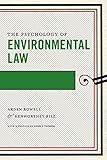The Psychology of Environmental Law / Kenworthey Bilz, Arden Rowell.
Material type: TextSeries: Psychology and the LawPublisher: New York, NY : New York University Press, [2021]Copyright date: ©2021Description: 1 online resource : 1 b/w illustrationContent type:
TextSeries: Psychology and the LawPublisher: New York, NY : New York University Press, [2021]Copyright date: ©2021Description: 1 online resource : 1 b/w illustrationContent type: - 9781479812301
- 9781479807574
- Environmental law -- Psychological aspects
- PSYCHOLOGY / Social Psychology
- Adaptation
- Artificial
- Availability Heuristic
- Availability
- Biases
- Causation
- Climate Change
- Cognition
- Complex
- Complexity
- Cost-Benefit Analysis
- Debiasing
- Diffuse
- Diffusion
- Discounting
- Ecosystem Management
- Emotion
- Environmental Injury
- Future Research
- General Law and Psychology
- Geoengineering
- Grandfathering
- Heuristics
- History
- Hometown Pollution
- Individual Action
- Institutions
- Intuitive Toxicology
- Latency
- Mitigation
- Motivation
- Multi-factorial
- Natural Resources
- Natural
- Nonhuman
- Politics
- Pollution
- Precautionary Principle
- Role-Relative Psychology
- Simplification
- Source Effect
- Sustainability
- Unidentifiability
- Valuation
- 344.046 23
- K3585 .R69 2021
- online - DeGruyter
| Item type | Current library | Call number | URL | Status | Notes | Barcode | |
|---|---|---|---|---|---|---|---|
 eBook
eBook
|
Biblioteca "Angelicum" Pont. Univ. S.Tommaso d'Aquino Nuvola online | online - DeGruyter (Browse shelf(Opens below)) | Online access | Not for loan (Accesso limitato) | Accesso per gli utenti autorizzati / Access for authorized users | (dgr)9781479807574 |
restricted access online access with authorization star
http://purl.org/coar/access_right/c_16ec
Offers psychological insights into how people perceive, respond to, value, and make decisions about the environmentEnvironmental law may seem a strange space to seek insights from psychology. Psychology, after all, seeks to illuminate the interior of the human mind, while environmental law is fundamentally concerned with the exterior surroundings-the environment-in which people live.Yet psychology is a crucial, undervalued factor in how laws shape people's interactions with the environment. Psychology can offer environmental law a rich, empirically informed account of why, when, and how people act in ways that affect the environment-which can then be used to more effectively pursue specific policy goals. When environmental law fails to incorporate insights from psychology, it risks misunderstanding and mispredicting human behaviors that may injure or otherwise affect the environment, and misprescribing legal tools to shape or mitigate those behaviors.The Psychology of Environmental Law provides key insights regarding how psychology can inform, explain, and improve how environmental law operates. It offers concrete analyses of the theoretical and practical payoffs in pollution control, ecosystem management, and climate change law and policy when psychological insights are taken into account.
Mode of access: Internet via World Wide Web.
In English.
Description based on online resource; title from PDF title page (publisher's Web site, viewed 01. Nov 2023)


